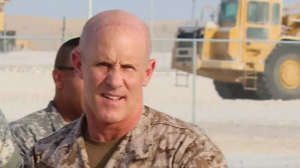Donald Trump is trying to persuade his preferred candidate to succeed Michael Flynn as national security adviser to change his mind after the retired admiral tapped for the role told the US president that he could not accept the White House position, according to two people familiar with the situation.
Mr Trump asked Robert Harward, a retired navy special forces officer, to succeed Mr Flynn, who was fired as national security adviser on Monday. At a press conference on Thursday, he said his decision to replace Mr Flynn had been made easier because he had an “outstanding” candidate to serve as a replacement.
But Mr Harward later told The Associated Press he had turned down the offer. He said: “It’s purely a personal issue. I’m in a unique position finally after being in the military for 40 years to enjoy some personal time.”
“Harward is conflicted between the call of duty and the obvious dysfunctionality,” said one person with first hand knowledge of the discussions between Mr Trump and Mr Harward. The second person said Mr Trump had asked Mr Harward to return to the White House for another meeting to try to change his mind.
Appointing Mr Harward, a well-liked navy veteran who is close to James Mattis, US defence secretary, would have helped Mr Trump start to reduce some of the turmoil that has rocked his administration in recent weeks. The White House did not respond to a request for comment about the decision by Mr Harward.
On Thursday, Mr Trump lashed out at suggestions that his administration was mired in “chaos”, saying it was “running like a fine-tuned machine”.
One of the people familiar with Mr Harward’s decision said he was concerned about whether the top advisers around Mr Trump would allow him to install his own staff on the NSC — particularly after suggestions that KT McFarland, Mr Flynn’s deputy, had been asked to remain. When he was offered the position, Mr Harward had told Mr Trump that he wanted some time to think over the idea.
Mr Harward, a senior executive at Lockheed Martin, served on the NSC during the administration of George W Bush. He rose to become deputy commander at Central Command, which oversees military operations in the Middle East and north Africa, where his immediate boss was Mr Mattis.
Widely respected in military circles, Mr Harward is viewed as much less volatile and more balanced than Mr Flynn, who was a controversial choice even before it emerged that he may have held illegal conversations with the Russian ambassador.
One of the other contenders for the job was David Petraeus, a retired general who was widely respected but fell from grace during his time as head of the Central Intelligence Agency for passing secret information to his mistress. The final candidate was Keith Kellogg, a retired army general who had served as chief of staff to Mr Flynn on the NSC and who is serving as the interim head of the inter-agency body.
Ask me anything
Explore related questions





